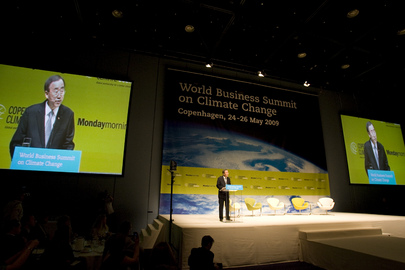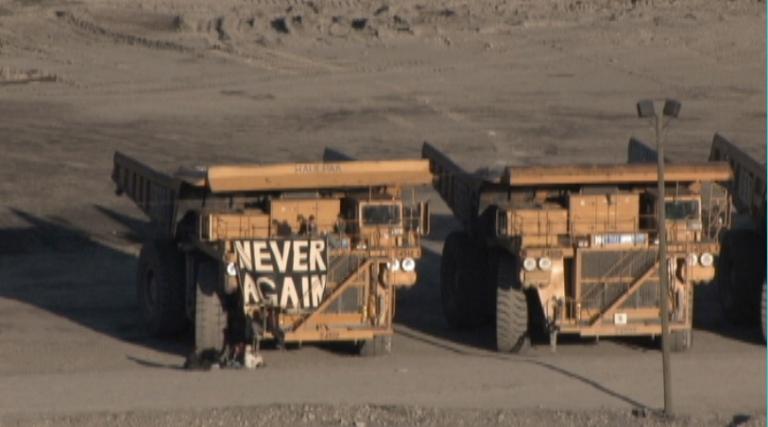The following is the text of U.N. Secretary-General Ban Ki-moon’s May 24 speech at the World Business Summit on Climate Change (as released by the UN).
 Secretary-General Ban Ki-moon addresses the opening of the World Business Summit on Climate Change.UN Photo/Eskinder DebebeSECRETERY-GENERAL BAN: I am delighted to be here. Perhaps more important, I am glad you have chosen to take the time to be here today.
Secretary-General Ban Ki-moon addresses the opening of the World Business Summit on Climate Change.UN Photo/Eskinder DebebeSECRETERY-GENERAL BAN: I am delighted to be here. Perhaps more important, I am glad you have chosen to take the time to be here today.
We meet at a critical moment in human history. Our planet is warming to dangerous levels. In December, the UN Climate Change Conference will meet here in Copenhagen to find solutions to this grave global threat.
As business leaders, you are crucially placed to ensure that government negotiators seal a deal.
We are enduring the worst economic downturn since [the] 1930s. It is essential that we do not allow this to hold back the political momentum, investment and innovation that we need to combat climate change.
Climate change is the defining challenge of our time. I also believe it is the most potent game-changer for business over the next century. It is an opportunity we must seize.
Today, I want to challenge you. I want to see you in the vanguard of an unprecedented effort to retool the global economy into one that is cleaner, greener and more sustainable.
You and your colleagues have the ingenuity and vision to lead by example where others – including governments – are lagging behind.
With your support, and through your example, we must harness the necessary political will to seal the deal on an ambitious new climate agreement in December here in Copenhagen.
This will not be easy. Fundamental change never is. But, if we get it right, we can reasonably look forward to sustained growth and prosperity.
If we get it wrong we face catastrophic damage to people, to the planet – and to the global marketplace. …
… Our excessive reliance on a fossil fuel-based economy is destroying our planet’s resources. It is impoverishing the poor. It is weakening the security of nations. And it is choking global economic potential.
The science is clear. Global emissions must peak in less than a decade to avert the worst consequences of climate change.
Many scientists are saying that worst-case projections are already being realized – indeed surpassed. This was the message from the International Scientific Congress, held here in Copenhagen in March.
We know that the safest way of reducing climate risks is to reduce emissions. We know that taking early action makes good business sense. And we know the cost of inaction will be much bigger that the cost of inaction now.
Some estimates say that rising greenhouse gas emissions could cause a decline of 5 per cent or more in global GDP.
Compare that with what it would take to bring down greenhouse gas emissions. The Intergovernmental Panel on Climate Change, IPCC, estimates that it could cost as little as 0.1 per cent of global GDP each year until 2030. And that does not factor in the multiple extra benefits to health and development.
Most importantly, we know we have the tools to change course. What we need is political will, at the highest level, coupled with the right policy signals and market incentives.
In September I am convening a summit meeting on climate change at the UN headquarters in New York to galvanize this political will among the political leaders.
I am inviting all Heads of State and Government. Business leaders will also be a part of the conversation. A strong message from the business community to governments worldwide may make all the difference.
As business leaders, you must make it clear to your leaders that doing the right thing for the climate is also the smart thing for global competitiveness and long-term prosperity.
We may never get a better opportunity. And if the world’s scientists are right, we may not get a second chance. …
We have seen how a local crisis – a bank failure, a disease outbreak – can quickly go global.
We live in an interconnected world. An effective agreement in Copenhagen would be a powerful vote of confidence in multilateralism. By the same token, failure would be bad news for everyone.
But there is yet another vitally important reason why we must seal a deal in December in Copenhagen.
We know that the right kind of deal will provide the regulatory certainty and long-term price signals that businesses are demanding. We know that a deal can unleash investment, stimulate innovation and facilitate the global spread of low-carbon technologies.
What is often overlooked is the impact a deal could have on global trade. Success in Copenhagen could set a powerful example: if Member States can find a way forward on an issue of such tremendous complexity, surely they can do the same in other areas, most notably the stalled Doha round of trade talks.
On the other hand, failure in Copenhagen could lead countries to turn inward in a misguided effort to handle the climate challenge on their own. We could see new, climate-related protectionist barriers.
But such go-it-alone policies simply cannot work, for climate or for trade.
They would undermine the core principles of non-discrimination that the international trading system has been building over the past six decades. They could lead to trade anarchy.
So we need to seal a deal in December for these reasons, too. To protect the trading regime. To enable trade to underpin development, spread green solutions and usher in the green economy.
Ladies and Gentlemen, climate change affects every aspect of society, from the health of the global economy to the health of our children. It is about the water in our wells and in our taps. It is about the food on the table.
It is about energy security and international security. It is at the core of nearly all the major challenges we face today
That is why it is an issue for Heads of State. And that is why it is an issue for business.
So far, only a small portion of the business and investment community has made climate change a strategic priority. Too many are sitting on the fence, waiting for others to act, or waiting for the clear policies that will signal a level playing field.
Others are defenders of the old order. For those who are directly or implicitly lobbying against climate action I have a clear message: your ideas are out of date, and you are running out of time.
What the fence sitters and the skeptics fail to understand is that climate change fundamentally changes the 21st century balance sheet.
Sooner or later there will be a higher price on carbon – imposed either by policy or by market forces.
Any multinational business that doesn”t have a strategy in place to deal with climate change will end up on the losing side of history.
That is not where you plan to be.
Investing now in green solutions is cheaper – and ultimately more profitable – than spending more, later, in a catch-up race for global competitiveness.
Polluting industries have successfully cleaned up their act in the past. That is part of the dynamic tradition of private-sector innovation. There are good examples today of industries in the developing and developed worlds cutting emissions.
I welcome such steps, and call for more.
We must also invest in the lower-carbon economic winners of the future.
I know that some argue that we cannot afford to act on climate change during a global recession.
I disagree. What we cannot afford is more short-sighted approaches. The global economy needs more than a quick fix. It needs a fundamental fix.
If we have learned anything from the financial crisis, it is that we must put an end to unethical and irresponsible behaviour and the tyrannical demand for short-term profit.
The price of a global bail-out may seem high, but it will pale next to the enormous human and economic costs of delaying action on climate change.
Continuing to pour trillions of dollars into fossil-fuel subsidies is like investing in sub-prime real estate. Our carbon-based infrastructure is like a toxic asset. that threatens the entire portfolio of global goods – from public health to food security.
We must direct investment away from dirty energy industries. It is time to create market incentives that reward long-term investment in clean energy and innovation. …
The smart money is on the green economy. Many of you are already showing the way.
You have shown that energy efficiency and green technologies can drive profitable performance.
Many of you are deeply engaged in the UN Global Compact. You are building a community of businesses, which I hope will show that “caring for the climate” can be a new paradigm for business success.
Many of your good examples are featured in a series of new studies that will be unveiled today under the “Caring for Climate” banner.
Throughout this meeting you will share important lessons. You will showcase solutions in construction, energy, transportation, manufacturing, and many more.
These examples show that a transformation is possible.
But to seize this transformation, we need the regulatory certainty and market signals that only a binding global climate change agreement can provide.
We need an agreement with clear long-term goals and mid-term targets.
And we need your voice, your influence, and your example.
You can help to seal a deal in December, and this is how you can do it:
I ask all of you to support the “Copenhagen Call” that we will issue at the end of this meeting. Use your influence as business leaders to bring climate change to the attention of policy makers and the public.
Instruct your government affairs teams to lobby vigorously and relentlessly for a successful outcome in Copenhagen in December. Do it now. And do it in every capital where you are represented.
Mobilize employees, partners, clients and customers to take a stand and demand climate action from governments.
Work with your trade associations and interest groups to ensure their lobbying supports an effective Copenhagen agreement.
Join the UN’s “Seal the Deal” campaign. Add your stamp to the global movement for action.
Above all, I encourage all of you to continue on the path of innovation and collaboration. Continue to spread green solutions through your supply chains. Continue to push for private-sector solutions that reduce climate risks- in health, water and natural resources, in insurance and investment and economic development.
This, my friends, is the essence of business statesmanship in the 21st century. Send a strong message to the governments that hold the keys to success in December.
Tell them to seal the deal.
Seal the deal to power green growth. Seal the deal to protect our planet. Seal the deal to build a more sustainable, prosperous global economy that will benefit all nations.
Your customers and your shareholders will reward you. And your children will thank you one day.
Thank you for your time. I wish you a most productive meeting.




